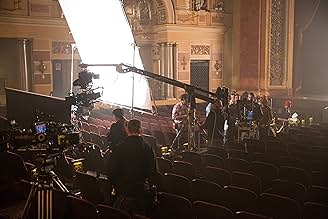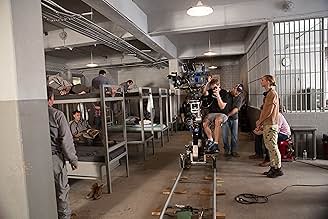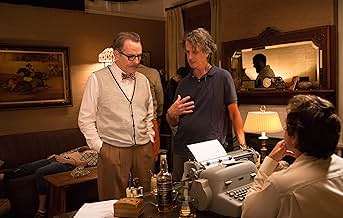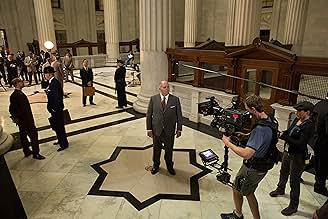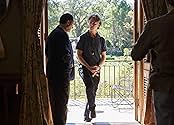IMDb RATING
7.4/10
87K
YOUR RATING
In 1947, Dalton Trumbo was Hollywood's top screenwriter, until he and other artists were jailed and blacklisted for their political beliefs.In 1947, Dalton Trumbo was Hollywood's top screenwriter, until he and other artists were jailed and blacklisted for their political beliefs.In 1947, Dalton Trumbo was Hollywood's top screenwriter, until he and other artists were jailed and blacklisted for their political beliefs.
- Nominated for 1 Oscar
- 8 wins & 45 nominations total
Toby Nichols
- Chris Trumbo (age 6-10)
- (as Tobias McDowell Nichols)
- Director
- Writers
- All cast & crew
- Production, box office & more at IMDbPro
Featured reviews
This movie is important. It tells the story of the struggles faced by the people who sought to have a differing political view in the 1950s and 60s. Their decision to think differently left them facing prejudice and hatred in America. This is the focus of this movie.
The story follow Dalton Trumbo, portrayed by Brian Cranston,a successful screenwriter in Hollywood in the 1950s. Cranston carries this movie on the shoulders of his performance. It is truly phenomenal how he brings such life and energy to this character. He captured my attention anytime he was on-screen and is without a doubt one of the major reasons you should see this movie.If you are a fan of any of Cranstons previous works you should love this movie for that reason alone. Cranston was nominated for an Oscar for this performance, a nomination I believe was well deserved.
The movie is of course based on a true story. while I cannot attest to the validity of the facts, I can confidently say that anyone interested in this period of history will find this movie much more enjoyable then reading a Wikipedia page.
Overall I give Trumbo 8/10 for its compelling plot and excellent performances. i would highly recommend it.
The story follow Dalton Trumbo, portrayed by Brian Cranston,a successful screenwriter in Hollywood in the 1950s. Cranston carries this movie on the shoulders of his performance. It is truly phenomenal how he brings such life and energy to this character. He captured my attention anytime he was on-screen and is without a doubt one of the major reasons you should see this movie.If you are a fan of any of Cranstons previous works you should love this movie for that reason alone. Cranston was nominated for an Oscar for this performance, a nomination I believe was well deserved.
The movie is of course based on a true story. while I cannot attest to the validity of the facts, I can confidently say that anyone interested in this period of history will find this movie much more enjoyable then reading a Wikipedia page.
Overall I give Trumbo 8/10 for its compelling plot and excellent performances. i would highly recommend it.
10jmsdxtr
Okay. I'll admit that I gave this film a ten because it should have a higher score altogether than the 7.3 it has, and I wanted to up it. But a solid 8 at least or even a 9, for sure. There are at least two reasons why this fine film is not getting a higher rating, I believe. One is that there are many people (including critics) who look only at it from a political standpoint, both left and right. And those on the right are not going to like it no matter what, fine acting, writing or whatever. The same in the left but conversely (and a smaller number). Secondly, this is a slow and thoughtful film that will not go over with many young viewers who are used to fast paced action and CGI content. they will find neither in Trumbo.
But, for students of history and for people who like a good story, without the fluff, it is all here. Classic good vs evil dynamics coupled with the inherent contradictions. The struggle of lost faith and eventual redemption. And perhaps mostly, excellent social dynamics especially centered around family loyalty and the struggle of holding to ones personal values.
As for the history, there is much here. As stated above more than any film ever having dealt with the subject. Films like "the Front" and "Guilty by Suspicion" are indeed good films that, especially at the time where breaking ground for a more nuanced exploration of the subject. That Trumbo is a biography is advantageous. A real biography, not a overly fictionalized and caricatured profile of the era. This despite that fact that some of the characters are fictionalized, they nonetheless represent the experiences and attitudes of real people. Louis C.K.'s Arlen Hird character being one. Dalton Trumbo may have had a better time of it than most, such as Hird. It is thought by some that the rising star of John Garfield was killed (literally-a heart attack) by the effect of the HUAC on him. This was a time, as the film states when people were fighting for their professional and personal life against what could be called a creeping fascist tendency in the US political environment. The fear and reaction and self promotion of many (ie John Wayne, Hedda Hopper et al.) is evident here.
The writing is excellent. My hat goes off to John McNamara and Bruce Cook for their adherence to historical accuracy and verisimilitude. The dialog is remarkable and keep you involved. It keeps you thinking and hits at an emotional level that few films do at all anymore. But it all comes together with the excellent direction of Jay Roach. To bring together the historical and personal is such a way is no small feat. He deserves an Oscar (as do McNamara and Cook).
I could go on...but just see the movie. You won't regret it. You can still watch Star Wars at Xmas...
But, for students of history and for people who like a good story, without the fluff, it is all here. Classic good vs evil dynamics coupled with the inherent contradictions. The struggle of lost faith and eventual redemption. And perhaps mostly, excellent social dynamics especially centered around family loyalty and the struggle of holding to ones personal values.
As for the history, there is much here. As stated above more than any film ever having dealt with the subject. Films like "the Front" and "Guilty by Suspicion" are indeed good films that, especially at the time where breaking ground for a more nuanced exploration of the subject. That Trumbo is a biography is advantageous. A real biography, not a overly fictionalized and caricatured profile of the era. This despite that fact that some of the characters are fictionalized, they nonetheless represent the experiences and attitudes of real people. Louis C.K.'s Arlen Hird character being one. Dalton Trumbo may have had a better time of it than most, such as Hird. It is thought by some that the rising star of John Garfield was killed (literally-a heart attack) by the effect of the HUAC on him. This was a time, as the film states when people were fighting for their professional and personal life against what could be called a creeping fascist tendency in the US political environment. The fear and reaction and self promotion of many (ie John Wayne, Hedda Hopper et al.) is evident here.
The writing is excellent. My hat goes off to John McNamara and Bruce Cook for their adherence to historical accuracy and verisimilitude. The dialog is remarkable and keep you involved. It keeps you thinking and hits at an emotional level that few films do at all anymore. But it all comes together with the excellent direction of Jay Roach. To bring together the historical and personal is such a way is no small feat. He deserves an Oscar (as do McNamara and Cook).
I could go on...but just see the movie. You won't regret it. You can still watch Star Wars at Xmas...
Trumbo is a period piece set in the late 40s and early 50s, following the life of Dalton Trumbo, arguably the leader of the Hollywood 10 who stood up to congress over what they saw as the illegal investigation and censorship of people's beliefs and free speech during the Second Red Scare after WWII. At the time, Congress and, in turn, members of the Hollywood elite blackballed writers, actors, directors, etc who identified as communists. Not spies for Moscow, but communists by political belief. Some faced jail time. Some lost their homes because they could not find work. Others encountered harsher realities. And Hollywood witch-hunt was merely a small part of a more wide-spread affront to civil liberties.
The time period itself is difficult to portray without seeming to be caricature - or perhaps style and communication have changed so much in 65 years that it just seems like caricature. Added to that difficulty are portrayals of John Wayne and Kirk Douglas, legends of film that, as a young person, I may have gone my whole life subconsciously thinking of as only existing on screen. Trumbo mostly rises to the occasion.
Much of Trumbo is comedic, and with intention, but the film also carries a certain amount of poignancy, if maybe a little less than it could use given the subject matter. Bryan Cranston is incredibly enjoyable to watch, and during the credits you get to watch a clip of the real Trumbo to compare. The portrayal is jarringly realistic (something you may question for the entirety of the film). Helen Mirren is a worthy antagonist, and very effectively displays the fear and anger that result from war - the need to dehumanize the enemy in order to survive the loss you feel as your family is fighting thousands of miles across the world, the need to justify pain through rigid ideology.
Other notable performances come from Michael Stuhlbarg, whose character, Eddie, provides for much of the films poignancy, and Diane Lane as the quiet but strong Cleo Trumbo, the rock of her family. John Goodman, is well cast as the comedic used car salesman of film, and Elle Fanning makes her mark as the rebellious daughter learning to be every bit of a force as her father.
It would be unfair to pin the failings of the film on a single person, but Louis C. K. continues to prove that being a great comedian does not make you a great actor. His portrayal is, in fact, so flat that it pulls you out of immersion in the film, a flaw that is further exacerbated by Bryan Cranston's mastery. Scenes between the two are simply absurd.
As a whole, the film's laughs are well earned and its feelings are well felt. Where the film falls short is to evoke, without personal reflection, the so obvious parallels between the state of our country today and that of the film. But perhaps that is not the goal. Perhaps the goal was to, with a bit of fun, portray a larger than life writer who decided to take on the world...and won. In that, Trumbo is a great success.
The time period itself is difficult to portray without seeming to be caricature - or perhaps style and communication have changed so much in 65 years that it just seems like caricature. Added to that difficulty are portrayals of John Wayne and Kirk Douglas, legends of film that, as a young person, I may have gone my whole life subconsciously thinking of as only existing on screen. Trumbo mostly rises to the occasion.
Much of Trumbo is comedic, and with intention, but the film also carries a certain amount of poignancy, if maybe a little less than it could use given the subject matter. Bryan Cranston is incredibly enjoyable to watch, and during the credits you get to watch a clip of the real Trumbo to compare. The portrayal is jarringly realistic (something you may question for the entirety of the film). Helen Mirren is a worthy antagonist, and very effectively displays the fear and anger that result from war - the need to dehumanize the enemy in order to survive the loss you feel as your family is fighting thousands of miles across the world, the need to justify pain through rigid ideology.
Other notable performances come from Michael Stuhlbarg, whose character, Eddie, provides for much of the films poignancy, and Diane Lane as the quiet but strong Cleo Trumbo, the rock of her family. John Goodman, is well cast as the comedic used car salesman of film, and Elle Fanning makes her mark as the rebellious daughter learning to be every bit of a force as her father.
It would be unfair to pin the failings of the film on a single person, but Louis C. K. continues to prove that being a great comedian does not make you a great actor. His portrayal is, in fact, so flat that it pulls you out of immersion in the film, a flaw that is further exacerbated by Bryan Cranston's mastery. Scenes between the two are simply absurd.
As a whole, the film's laughs are well earned and its feelings are well felt. Where the film falls short is to evoke, without personal reflection, the so obvious parallels between the state of our country today and that of the film. But perhaps that is not the goal. Perhaps the goal was to, with a bit of fun, portray a larger than life writer who decided to take on the world...and won. In that, Trumbo is a great success.
I have seen so many documentaries about this era. The Hollywood blacklist, McCarthyism.
However, this takes a fresh, personal look at what happened. It shows how folks actually handled this, rather than just the circumstances of the time and newsreels of Congress hearings. How did they do it? This shows the how and when, the risks. Of course, Trumbo captures the full story of the persecution.
Stay to the very end of the film, stay for the credits as some of the clips they show are so meaningful.
I don't know if Trumbo was the person shown in the film, but if he was, he was an American hero. I think films like this represent the spirit, the best or worst of the spirit of what happened.
Trumbo wasn't just a hero from the look of it, he was also a survivor who made his way through the worst of it and came out on the other side.
However, this takes a fresh, personal look at what happened. It shows how folks actually handled this, rather than just the circumstances of the time and newsreels of Congress hearings. How did they do it? This shows the how and when, the risks. Of course, Trumbo captures the full story of the persecution.
Stay to the very end of the film, stay for the credits as some of the clips they show are so meaningful.
I don't know if Trumbo was the person shown in the film, but if he was, he was an American hero. I think films like this represent the spirit, the best or worst of the spirit of what happened.
Trumbo wasn't just a hero from the look of it, he was also a survivor who made his way through the worst of it and came out on the other side.
All movie fans should recognize the name of Dalton Trumbo. Even if his heyday was a good half-century ago, his actions during one of Hollywood's very darkest periods still have tremendous impact even today. Especially today, for that matter.
Some quick background. You may recall that in World War II, the US and the Soviets were allies but that after the war we became distrustful adversaries. This time was known as the Cold War – since the two countries didn't fight one another – and really ended only in the late 1980s. Prior to the end of WW II, many Americans joined the Communist Party as a way to fight the rise of Fascism in Europe. After the war, current and former members of the Party were looked upon as pariahs of the highest order. Screenwriter Dalton Trumbo (Bryan Cranston) was one of these pariahs. It didn't help that he actively tried to rally technical workers on film sets (grips, lighting and sound technicians) to strike for higher pay. Unionizing was seen as a bad thing, despite the gains it had achieved for American workers earlier in the century.
Trumbo's membership in the Party wasn't a big deal at first, but then gossip columnist Hedda Hopper (Helen Mirren), who wielded an enormous amount of power in Hollywood, took it as a personal affront and used her column (and weekly appearance in newsreels) to denounce Communism in general and Trumbo in particular. Kicking the whole scandal into high gear was a little-known congressional group – the House Un-American Activities Committee. These guys tried to rout out Commies from Hollywood (which it saw as holding a lot of sway over Americans, much more so than today) by calling a group of known or suspected Communists to Washington for sworn testimony. These men were known as the Hollywood Ten. Trumbo was one of them, and he refused to tell the committee the names of anyone else who was or who could be a Communist. He, like his fellow Ten members, was found in contempt. Later, someone not in the group did name Trumbo, and he was put in prison for a full year.
When he got out, no one would hire him (or any of the others in the Ten). Except for King Brothers Studio, which couldn't pay him much. But Trumbo worked fast as both a writer of original stuff and a fixer of existing scripts. The Kings loved him. So much so that the others in the Ten were offered jobs (for no credit, same as Trumbo) working as script doctors. During this time, Trumbo also got work from some friendly sorts in the business by selling them a script but not taking on-screen credit; the credit typically went to a fictitious person, or to a willing accomplice – known as a front. Through this method, Trumbo won two writing Oscars – although no one knew it at the time.
Dalton Trumbo fought for himself, his fellow writers, and for anyone for whom the Bill of Rights holds any meaning. He reasoned that if people could be silenced for political beliefs, then anyone could be silenced for any reason. This is, unfortunately, still true today. And although he didn't receive credit at the time, Trumbo was awarded his Oscars eventually (one posthumously). He's recognized as being one of the very greatest screenwriters the world has ever known. The movie does a terrific job describing Trumbo's struggles – and that of his family: his wife Cleo (Diane Lane) and his three doting children. The toll that his stance took on them was noticeable to everyone except for Trumbo himself.
Cranston turns in what was an Oscar-nominated performance, but his was not the only one of note. Lane is superb as his suffering, strong better half. Elle Fanning, as his eldest daughter, is also a standout, as are John Goodman (as Frank King) and Alan Tudyk (as writer Ian McLellan Hunter). Spellbinding from start to finish, and all screenwriters owe Trumbo a huge debt of gratitude for his long struggle on their behalf.
Some quick background. You may recall that in World War II, the US and the Soviets were allies but that after the war we became distrustful adversaries. This time was known as the Cold War – since the two countries didn't fight one another – and really ended only in the late 1980s. Prior to the end of WW II, many Americans joined the Communist Party as a way to fight the rise of Fascism in Europe. After the war, current and former members of the Party were looked upon as pariahs of the highest order. Screenwriter Dalton Trumbo (Bryan Cranston) was one of these pariahs. It didn't help that he actively tried to rally technical workers on film sets (grips, lighting and sound technicians) to strike for higher pay. Unionizing was seen as a bad thing, despite the gains it had achieved for American workers earlier in the century.
Trumbo's membership in the Party wasn't a big deal at first, but then gossip columnist Hedda Hopper (Helen Mirren), who wielded an enormous amount of power in Hollywood, took it as a personal affront and used her column (and weekly appearance in newsreels) to denounce Communism in general and Trumbo in particular. Kicking the whole scandal into high gear was a little-known congressional group – the House Un-American Activities Committee. These guys tried to rout out Commies from Hollywood (which it saw as holding a lot of sway over Americans, much more so than today) by calling a group of known or suspected Communists to Washington for sworn testimony. These men were known as the Hollywood Ten. Trumbo was one of them, and he refused to tell the committee the names of anyone else who was or who could be a Communist. He, like his fellow Ten members, was found in contempt. Later, someone not in the group did name Trumbo, and he was put in prison for a full year.
When he got out, no one would hire him (or any of the others in the Ten). Except for King Brothers Studio, which couldn't pay him much. But Trumbo worked fast as both a writer of original stuff and a fixer of existing scripts. The Kings loved him. So much so that the others in the Ten were offered jobs (for no credit, same as Trumbo) working as script doctors. During this time, Trumbo also got work from some friendly sorts in the business by selling them a script but not taking on-screen credit; the credit typically went to a fictitious person, or to a willing accomplice – known as a front. Through this method, Trumbo won two writing Oscars – although no one knew it at the time.
Dalton Trumbo fought for himself, his fellow writers, and for anyone for whom the Bill of Rights holds any meaning. He reasoned that if people could be silenced for political beliefs, then anyone could be silenced for any reason. This is, unfortunately, still true today. And although he didn't receive credit at the time, Trumbo was awarded his Oscars eventually (one posthumously). He's recognized as being one of the very greatest screenwriters the world has ever known. The movie does a terrific job describing Trumbo's struggles – and that of his family: his wife Cleo (Diane Lane) and his three doting children. The toll that his stance took on them was noticeable to everyone except for Trumbo himself.
Cranston turns in what was an Oscar-nominated performance, but his was not the only one of note. Lane is superb as his suffering, strong better half. Elle Fanning, as his eldest daughter, is also a standout, as are John Goodman (as Frank King) and Alan Tudyk (as writer Ian McLellan Hunter). Spellbinding from start to finish, and all screenwriters owe Trumbo a huge debt of gratitude for his long struggle on their behalf.
Did you know
- TriviaBryan Cranston revealed in a radio interview that Kirk Douglas approved of this movie, but his major complaint was that he wasn't asked to play himself.
- GoofsWhen the Oscar is presented for Best Screenplay at the 1954 Awards the presenter says, "And the Oscar goes to..." This phrase was not used by presenters until the 61st Academy Awards in 1989. In the 1950s the presenter would have said, "And the winner is..." when presenting an Oscar.
- Quotes
Dalton Trumbo: Friends? What friends? Who the hell has the luxury of friends? I've got allies and enemies. There's no room for anything else.
- Crazy creditsAs the credit scroll begins, photos of Dalton Trumbo, his family, and other people portrayed in the film are shown. These are followed by historical footage of Trumbo giving an interview (from the same one where he acknowledges that he is 'Robert Rich').
- Alternate versionsThe version of the movie that has been screened on Indian theaters and telecast in India is a PG-13 level cut that has been rated UA by the CBFC.
Details
- Release date
- Country of origin
- Official sites
- Language
- Also known as
- Trumbo
- Filming locations
- Production companies
- See more company credits at IMDbPro
Box office
- Budget
- $15,000,000 (estimated)
- Gross US & Canada
- $7,857,741
- Opening weekend US & Canada
- $74,177
- Nov 8, 2015
- Gross worldwide
- $11,430,025
- Runtime
- 2h 4m(124 min)
- Color
- Sound mix
- Aspect ratio
- 1.85 : 1
Contribute to this page
Suggest an edit or add missing content








